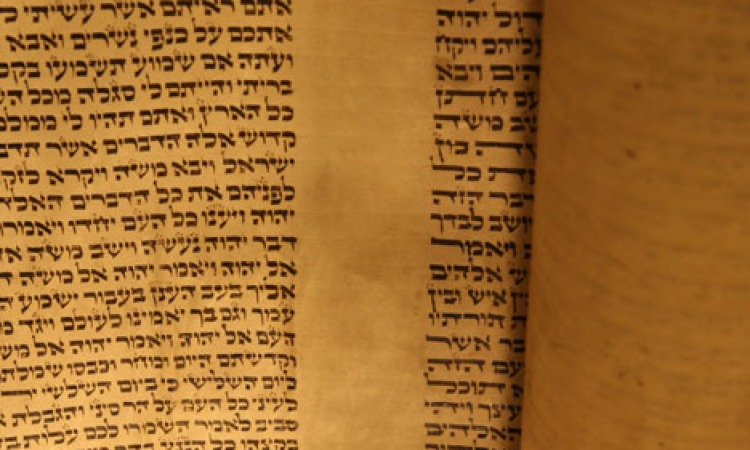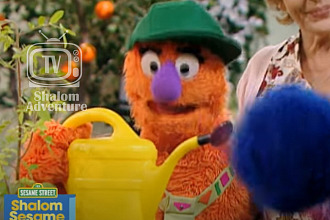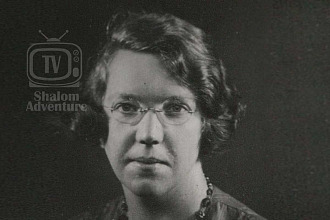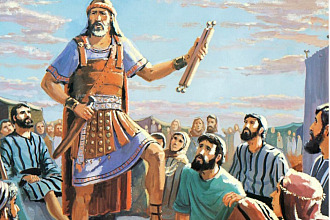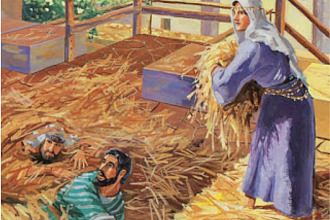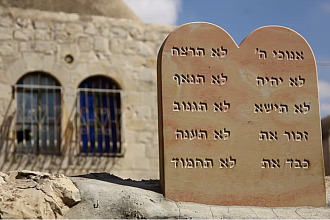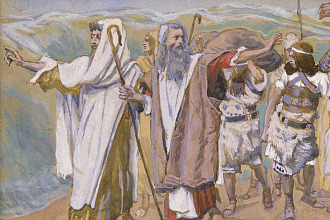Parasha for the Week: Chukat Numbers 19:1 – 22:1
Haftara for the Week: Judges 11:1 - 33
Apostolic Writings: Mark 5: 21 - 34
Overview:
The laws of the para aduma (the red heifer) are detailed. These laws are for the ritual purification of one who comes into contact with death.
After nearly 40 years in the desert, Miriam dies and is buried at Kadesh.
The people complain about the loss of their water supply that until now has been provided miraculously.
Aharon and Moshe pray for the people’s welfare. G-d commands them to gather the nation at Meribah and speak to a designated rock so that water will flow forth. Distressed by the people’s lack of faith, Moshe hits the rock instead of speaking to it.
He thus fails to produce the intended public demonstration of G-d’s mastery over the world, which would have resulted had the rock produced water merely at Moshe’s word. Therefore, G-d tells Moshe and Aharon that they will not bring the people into the Land.
Bnei Israel resume their travels, but because the King of Edom, a descendant of Esav, denies them passage through his country, they do not travel the most direct route to Eretz Yisrael. When they reach Mount Hor, Aharon dies and his son Eleazar is invested with his priestly garments and responsibilities.
Aharon was beloved by all, and the entire nation mourns him 30 days. Sichon the Amorite attacks Bnei Yisrael when they ask to pass through his land. As a result, Bnei Yisrael conquer the lands that Sichon had previously seized from the Amonites on the east bank of the Jordan River.
"Chukat – Parasha’s Title"
Parashat Chukat begins saying: “Hashem spoke to Moses and Aaron saying, “This is the statute of the Torah which Hashem commanded saying: Speak to Bnei-Yisrael that they bring to you a flawless red heifer on which there is no blemish and on which has never been a yoke.” (Numbers 19:1–2). Chukat from the root Chok is one of the Hebrew word which is defined as "law" translated in this version as "statute." Maimonides affirms that most of the Chukot are laws which are very difficult to understand, and their utility are obvious. It is the case of these verses, which describe the mitzvah of Parah Adumah— “Red Heifer or Red Cow.” The ashes of a red heifer mixed with water were used to purify those who came into contact with a dead body so they could enter into the Holy Temple. However the priest who led this process become himself unclean. By cleaning others he become unclean, it is like if he accept on him the uncleanness of those who came to him to be cleansed.
"Moses' Disappointments"
Through this entire portion Moshe suffers through a series of disappointments and tragedies.
1. His sister Miriam dies.
2. The well ceases to flow from the rock that traveled with Israel.
3. The people complain bitterly
4. Moshe doesn’t talk to the rock. He hits it.
5. Moses will not enter Eretz Yisrael.
6. Edom answers “No” to Moses’ request and threatens war.
7. Moses is obliged to take the long route toward the land of Israel.
8. The death of his only brother Aharon.
9. Moshe is left alone, with neither Miriam nor Aharon to support him.
10. Immediately after Aharon’s death, Israel is attacked by the King of Arad in the south.
11. Though the battle is won, the Israelites, still not satisfied, verbally attack Moshe and Hashem complaining, “Why did you bring us to die in this wilderness with no food or water and our souls are disgusted with the light fare of manna!” (Numbers 21:5).
12. Fiery snakes attack the people. But Moshe had strength, courage, and love for the children of Israel. He pleads to Hashem on behalf of his nation: “Stop the snakes!
Haftarah Judges 11:1 - 33
The haftarah starts saying: “Now Jephthah the Gileadite was a mighty man of valor, but he was son of a prostitute,” (Judges 11:1). He will be chosen later because he was a “mighty man” gibor in Hebrew which could mean “hero.” But from the first verse we discover that Jephthah’s family is not clear. That is why before being a “Judge” in Israel, he would be rejected by the Gilead family, its own family: “But Gilead’s wife bore him sons, and when the wife’s sons grew up, they drove Jephthah out and said to him, “You won’t inherit in our father’s house, for you are a son of another woman.” (2). It is written that he was rejected because his mother was not the legitimate wife of Gilead: “you are a son of another woman” That is why the Scherman Jewish translation published in the Rubin Edition of the Hebrew word zona is not a “prostitute” or “harlot,” but “strange” in the sense of “foreign” “He was the son of a strange woman” (1). That does not mean a non-Israelite woman, but a woman which was not from their tribe. We understand that the legitimate sons of Gilead were not happy that their father took another wife, and had only one son with this woman, thus they were so upset that they spread the rumor of “the son of a prostitute.” But it is clear that if he was the son of a prostitute or of a non-Israelite lady, Israel would have not chosen this man as the leader of Israel.
The Amonites came to provoke Israel for what happened during the time of Moses. “After a time the Ammonites made war against Israel” (4). Now the Gileadites must admit that they made a mistake to send away Jephthah, they must put away their pride and ask someone they rejected as their leaders (5). The people of Gilead called Jephthah to help them in this situation as a "chief" (6) Katzin means a chief of war, they were not proposing Jephthah to be their leader, but just to help them to win the war, that is why he was not happy and refused their proposition, “Jephthah then said to the elders of Gilead, Didn’t you hate me and drive me out of my father’s house? So why are you coming to me now that you’re in trouble?’ ” (7). They understood what Jephthah was saying, then they made a promise: “Here is why we’re now turning to you,” the elders of Gilead said to Jephthah. “Come with us, fight the children of Ammon, and then you will become head over all the inhabitants of Gilead.” (8), now the proposition is clearer, come to help us to win the war and you will be the Rosh “Head” of the Gileadites, the leader of his people. In spite of his weakness Jephthah was a man of God, and he knew that this kind of battle is not won by physical strength but by spiritual forces, that means God. And to have God on his side, he should first be sure that he must have the trust of all the nation, not just a family. The promise of being their Rosh was not enough for him they must make their decision official right now, not after the battle. It is what they did: “Then Jephthah went with the elders of Gilead, and the people made him head and chief over them, after Jephthah repeated all his terms before Hashem at Mizpah.” (11), it was almost an official coronation before God and was anointed as the leader of the nation in Mizpah. It was the place where God performed a great miracle for Joshua (Josh. 11:8), it became a place of meeting and prayer in commemoration of that great event. Then, he accepted to lead with God’s help the people in this difficult time.
Jephthah was a great political leader who knows that unnecessary war will not be for the benefit of anyone. That is why he sent a delegation to the Amonites to debate with them and to reach an understanding. The fact that he received the Ruach Hashem (29) could mean a certain level of gift of prophecy in order to convince Israel to follow him in this war. Israel got victory (32–33). This victory was for the glory of God among the nations. It is crucial for us to know whether or not we oppose G-d’s will. Victory is in the hand of G-d, but only if we obey him.
Apostolic Writings: Mark 5:21 - 34
The text of the parasha from Numbers is not an easy text, especially chapter 19 about the Red Heifer. The ritual of the Red Heifer is a strange way to purify unclean people. The rules were also very strong—anyone who touched the Red Heifer or the burnt ashes was considered unclean (Numbers 19:6-8). In the same way, anyone who touched a corpse, a dead body, was considered unclean. (Numbers 19:11-13). Next we find the law of purification: how to become clean when an unclean man, a dead animal or even an unclean vessel has been touched. We discover that even the one who cleanses the unclean becomes unclean (Numbers 19:21). The object needing cleansing becomes the source of uncleanness.
Our Besorah in Mark is also about clean and unclean people. We recall that in the last portions Yeshua and his talmidim were on the east side of the sea of Galilee and now Yeshua comes back to the Jewish region of Galilee. “When Yeshua had crossed over in the boat again to the other side, a big crowd gathered around Him; and He was by the sea.” (Mark 5:21). Yeshua is very popular. He is the “second Moses,” and people gather around him to hear his teaching and his parables. The common belief of Christians today is that the Jews rejected Yeshua, but that is not true. All through the gospels we discover the popularity of Yeshua among Jews. He was rejected by the Gentiles on the “other side” of the sea of Galilee, but as soon he crossed the lake he was welcomed by Jews, both common people and leaders of the synagogues such as Jairus. In our Besorah, Jairus comes to Yeshua with great respect: “Then one of the synagogue leaders, named Jairus, comes. Seeing Him, he falls at His feet.” (Mark 5:22). This is strange behavior because Jews never kneel before anyone. But this ruler of the synagogue loved his daughter so much that he was ready to do anything he could to have her healed. He has heard about Yeshua and he has accepted him as a messenger of G-d. We are not sure that he had already accepted Yeshua as the Messiah, but he knew the stories of prophets such as Elijah and Elisha who healed people and even resurrected children. Yes, in his mind this Yeshua is a prophet sent by G-d. That is why he “begged him repeatedly, ‘My little daughter is at the point of death. Come and lay your hands on her, so that she may be made well, and live’” (Mark 5:22-23). This man, with great humility, understands that he does not deserve any favor from G-d; this is why he first, “falls at His feet” and second, he “begged him.” We see here a great faith in G-d and a great faith in Yeshua! We are still at the beginning of the gospel, at the beginning of the work of Yeshua, but this synagogue’s leader has heard and seen Yeshua and put his faith in him.
Yeshua recognized the exceptional faith of this man who believed in him without the proof of the resurrection and the ascension. “So Yeshua went off with him,” (5:24). Yeshua was ready to go with this man to his home and to heal his daughter. He certainly knew the situation of the daughter who was not only sick, but really at the point of death. In fact she did die when a woman interrupted Yeshua on his way to Jairus’ home. This story will continue next week.
As long as the people of Israel lived in Eretz Israel they followed all the mitzvot given by G-d through Moses. That is why at that time the laws of purity were very important—the people of Israel strictly followed the rules of the Torah. In the text of our parasha it is written that it is forbidden to touch corpses.
Most of the people did not even want to touch any “almost dead” body—they were afraid of also becoming unclean. However, Yeshua does not follow these rules: he is the one who cleanses, purifies, and forgives everyone. That is why he answered in the affirmative and went to see Jairus’ daughter, touched her and healed her.
But an incident happened on Yeshua’s way to Jairus’ home. A woman, unclean because of a hemorrhagic flow of blood, comes to Yeshua. She has been sick for twelve years and no doctor had been able to give her relief or heal her. This is another case of very difficult uncleanness—nothing was more contaminating than blood, and the Jewish people knew it. What a difficult life it was in this ancient time full of prejudice and religious superstitions. It was impossible for this woman to live in the same house with her family, or in the same room with her husband. Menstruation made women ceremonially unclean and cut them off from any fellowship with G-d’s people for a part of every month during which no intimacy with her husband was allowed. Everywhere this woman went she had to say, to cry aloud, to the people about her uncleanness. This woman was bleeding for twelve years; she was excluded everywhere. She suffered not only physical disease but also great moral distress.
The text says that this lady: “had suffered much under many doctors. She had spent all that she had without benefit; instead, she grew worse.” (5:26). After twelve years of suffering, she was ready to do anything in order to be healed. This lady took a great risk, yet she had faith in Yeshua and decided to touch him. She took the risk of making Yeshua unclean for seven days, but her desire to be healed was greater than her fear: “When she heard about Yeshua, she came through the crowd from behind and touched His garment.” (5:27). Healing was more important to her than anything else and she touched Yeshua’s tzitzit (tassels) with her hand. This woman had even greater faith than Jairus. This lady believed that healing would emanate from the person of Yeshua even though he would not know that he was healing someone. It seems that this portion of the gospel would like to tell us that Yeshua was the greatest healer of all history. All commentators agree that Yeshua was a practicing and faithful Jew, that is why, obeying G-d, he wore permanently the tassels or tzitzit (required in Numbers 15:37-41). Thus, this woman did not touch any other part of his garments, but his tzitzit only, which were visible to everyone on the edges of his garments. This was not superstition or magic, but real faith.
Yeshua felt something and said: “Who touched my tzitzit?” (5:30). The disciples found this question absurd: “His disciples responded, ‘You see the crowd pressing upon You and you say, ‘Who touched Me?'” (5:31). The lady was trembling. She was afraid of the reaction of Yeshua or his talmidim. Yeshua knew that something had happened: “But He kept looking around to see who had done this.” (5:32). First, the woman knew that she should not be in this public place because anyone who came in contact with her would become unclean. And secondly, she knew that she had put Yeshua in a difficult situation, making him unclean for several days, “But the woman, scared and shaking, knowing what had happened to her, came and fell down before Him and told Him the whole truth.” (Mark 5:33). She was very frightened and must have been surprised when Yeshua commended her for her faith and was not upset about what had happened. “He said to her, ‘Daughter, your faith has made you well. Go in shalom and be healed from your disease.’” (5:34). These stories of healing teach us again and again about the great unconditional love of G-d and Yeshua..

